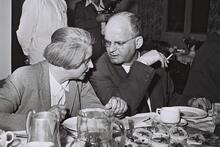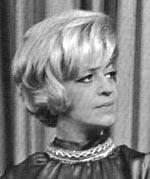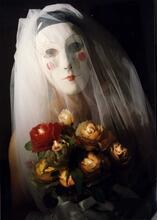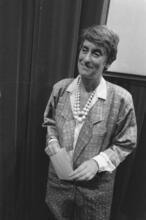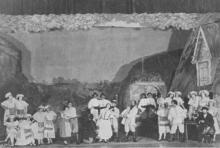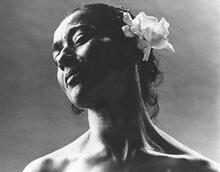Berta Singerman
A child prodigy, Berta Singerman began her acting career in her native language of Yiddish, and then in continued in Spanish, which became her main language of performance. She acted in four films, but her main work was in theater and poetry recitals. Singerman performed in almost all of Latin America, Spain, and Israel, with a universal repertoire that also included works from her Jewish heritage. Berta Singerman maintained friendships with leading writers and poets of the Spanish-speaking world, including Pablo Neruda, Juan Ramón Jiménez, Alfonsina Storni, Gabriela Mistral, Horacio Quiroga, and Alejo Carpentier.
Early Life and Family
Berta Singerman was born on September 9, 1901, in Mozyr, in the Gomel district of Russia (later Belarus), into a family of observant Jews.
Several of her paternal ancestors were cantors (chazanim), which may be the origin of her surname. Her paternal grandfather, Jacob Singerman, was a chazan in the city of Pinsk. Her grandmother, Rebecca Singerman, was the daughter of Moses Pinchuk, Rabbi of Pinsk. Jacob and Rebecca Singerman had six children. The fifth, Aaron, worked as a melamed (a teacher in a religious school). Because being a melamed did not pay enough to live on, he also worked in a match factory. Because of his success, he was sent to found a new factory in Mozyr. When his father died, Aaron brought his mother and brothers to Mozyr.
In Mozyr, Aaron Singerman married Sarah Begun, daughter of David and Myriam Begun, in 1899. Their daughter Berta was born two years later, followed by Hana and David. Two more children—Paulina, who would also become an actress, and Arturo—were born after the family moved to Argentina.
Aaron Singerman abandoned the observance of Jewish religious principles but maintained a close relationship with the Jewish people and its culture and history. In her memoirs, Berta recalled that her observant grandmother taught her religious practices and read the Bible with her, while her father instilled in her a love for the Jewish people and taught her Jewish history with a rationalist approach.
Move to Argentina
In 1905, following the unsuccessful revolution against the Tsar in Russia, Aaron Singerman immigrated to Argentina to avoid being conscripted into the Russian army and facing persecution due to his political and revolutionary ideology. Shortly after arriving in Argentina, he was able to bring his family to join him in Buenos Aires.
At first, Aaron found work in the inland region of the province of Buenos Aires, either laying railroad tracks or as a farmhand. However, he soon moved to the city of Buenos Aires, settling in the Villa Crespo neighborhood. There, he started making picture frames, while also pursuing a passion for singing by participating in theater productions.
Entering the Theater
Aaron frequently attended theater performances with his young daughters, Berta and Hana. He also taught them to recite poetry in Yiddish and Spanish, as well as how to perform onstage for their neighbors. Berta's first public performance was in second grade at the local public school, where she successfully and dramatically delivered a monologue at a school celebration.
Around the same time, Hana was invited to act in a play put on at a local theater in the neighborhood. Just before going on stage, however, Hana suffered a stroke that left her semi-paralyzed. Berta, who had also studied the part, filled in for her sister. Because of her successful performance, she was incorporated into subsequent performances, as well as other plays.
On the Jewish holiday of The Day of Atonement, which falls on the 10th day of the Hebrew month of Tishrei and is devoted to prayer and fasting.Yom Kippur in 1911, Berta participated in a synagogue choir disguised as a boy. The following summer, her father took her on tour to Jewish agricultural colonies in the Entre Ríos province, where she performed with Jewish theater groups, as well as doing monologues and dramatic poetry recitations.
From 1913 onward, Berta performed in Buenos Aires with Jewish theater companies to great acclaim. The companies performed in Yiddish, staging Jewish plays as well as plays translated from other languages. Her involvement in shows was enough to draw audiences already familiar with her reputation as "Di wunder kind" (the wonder child). Her father also performed in choruses. During the summer months, their acting troupe of Jewish artists toured Argentina's interior towns and cities, performing for Jewish audiences across the country.
A Renowned Actress

Argentine actress Berta Singerman, 1930. Via Wikimedia Commons.
By the late 1910s, Singerman was already a renowned actress. One of her standout Yiddish theater performances was in S. Ansky’s play The Dybbuk, staged in honor of Yiddish and Hebrew writer Hersh David Nomberg’s visit to Argentina. Following the success of the one originally scheduled performance, in which Singerman played the leading female role of Leah, seven additional shows were added. Her performance in a new staging of The Dybbuk in 1921 was one of her most important theater performances in Yiddish in Argentina.
At fifteen years old, Singerman met Enrique Rubén Stolek, a fervent admirer; they began an intimate relationship and married three years later. Stolek, an entertainment businessman, accompanied Singerman and her father on her first tour to Montevideo, Uruguay, where she received acclaim from audiences. He supported her throughout her artistic career.
Singerman became acquainted with many renowned writers, connecting with the Anaconda group founded by famous authors Horacio Quiroga and Samuel Glusberg. The group included other luminaries, such as renowned poet Alfonsina Storni. Over time, Singerman’s circle of writer friends expanded to include Pablo Neruda, Juan Ramón Jiménez, Gabriela Mistral, and Alejo Carpentier.
In 1921, Singerman acted in the first of four films, the silent movie The Harrods Salesgirl. She later acted in Nothing But a Woman (1934), Ashes in the Wind (1942), and, after several decades dedicated exclusively to theater, Stigma (1982).
In 1932, Singerman founded and directed the Chamber Theater Company (Compañía de Teatro de Cámara). With this troupe, she put on productions spanning a wide theatrical repertoire, including universal works like Anna Karenina by Leon Tolstoy, The Apple Cart by George Bernard Shaw, A Doll's House and The Lady From the Sea by Henrik Ibsen, A Day In October by George Kaiser, Cristina's Pact by Conrado Nalé Roxlo, and The Savage Woman by Jean Anouilh. In the 1960s, Singerman starred in productions of The Human Voice by Jean Cocteau and Sarah Bernhardt by Enrique Suárez de Deza.
Poetry Recitation
Despite her theatrical success, Singerman’s impressive artistic and professional trajectory from the 1920s onwards stemmed from her ability as a poetry interpreter. As the famous Spanish composer Manuel de Falla said "While we composers seek music for words, Berta extracts music from words." She was the first, and very illustrious, professional Spanish-language poetry reciter in Latin America, Spain, and Portugal.
Over the course of her career, Singerman interpreted poems by Alfonsina Storni (“Start Flying,” Date a volar), Antonio Machado, Eugen Jebeleanu (“Hiroshima“), Federico García Lorca (“The Goring and the Death of Ignacio Sánchez Mejía,” La cogida y la muerte de Ignacio Sánchez Mejía), Gabriela Mistral, Juan Ramón Jiménez, Juana de Ibarbourou (“The Sweet Miracle,” El dulce milagro), Julia Prilutzky Farny, León Felipe (“Auschwitz“), Lope de Vega, Nicolás Guillén, Rafael Alberti (“The beggar,” El mendigo), Rubén Darío (“Tale to Margarita,” Cuento a Margarita), Rudyard Kipling (“Boots,” Botas), and many others. Her recitations of “The Song of the Songs” from the Hebrew Bible and “The Sermon of the Mount” from the New Testament demonstrated her ability to move her audience.
Argentine actress and reciter of poetry Berta Singerman, reading “Date a Volar” (Start Flying), by Alfonsina Storni.
Argentine actress and reciter of poetry Berta Singerman, reading “El dulce Milagro” (The Sweet Miracle), by Juana de Ibarbourou.
In 1946 Singerman returned to the theater and acted for two years with an Argentine company in Buenos Aires, in Santiago, Chile, and in Montevideo, Uruguay. She was also well known in Brazil and Mexico.
Political and Religious Commitments
Argentine actress and reciter of poetry Berta Singerman, reciting “La Marsellasa” (La Marseilaise).
In 1944, Singerman was heavily criticized by the Argentine military government, which sympathized with the Axis powers, for signing anti-Franco manifestos and for reciting the Marseillaise at celebrations of the liberation of Paris in late August. She also suffered personal discrimination due to her Jewish identity (Clarin), and by the Peronist government because he refused to recite texts of praise to President Juan Perón and his wife Eva Perón in radio transmissions in the early 1950s (Mis dos vidas, 112-114, 115-116).
Berta Singerman was also actively involved in Jewish and Zionist causes. Throughout her career, she generously donated proceeds from many performances across Latin America to the Jewish National Fund and other Jewish campaigns. According to her own account, she collaborated with the Jewish Argentine writer Alberto Gerchunoff to promote, in various Latin American countries, a vote in favor of partitioning the land of Israel into separate Jewish and Arab states during the crucial United Nations General Assembly vote on November 29, 1947.
Singerman demonstrated her personal connection to Israel through two visits. The first occurred in the 1950s, following an invitation by the Workers Organization (Histadrut Haovdim). During this trip, she performed in many cities, including Tel Aviv (at the Histadrut Ohel Theater) and Haifa. She also visited and engaged with twelve kibbutzim (communal villages). Her second visit took place in the mid-1960s.
In 1981, Singerman pubished her memoir, My Two Lives (Mis dos vidas). With this title, she expressed her sense of the distance between the way the public and her admirers saw her as an actress and how she perceived herself. In this book she refers to multiple aspects of her life, including the most personal, such as extramarital relationships.
In her later years Singerman appeared in poetic recitals at the San Martin Municipal Theatre and the National Theater Cervantes; one of her last appearances, in 1990, was at the Teatro Colón opera theater in Buenos Aires.
Berta Singerman passed away on December 10, 1998. Her remains were laid to rest in the Jewish cemetery of Ciudadela, in the suburbs of Buenos Aires.
"Murió Berta Singerman, nacida para dar voz a grandes poemas." Clarín, December 10, 1998; https://www.clarin.com/sociedad/murio-berta-singerman-nacida-dar-voz-grandes-poemas_0_HJ8fl4f1I3g.html (accessed February 11, 2024).
Parmeral, Ramón. "Berta Singerman." Poesía Palmeriana, July 10, 2013; https://poesapalmeriana.blogspot.com/2013/07/berta-singerman-declamadora-cante-y.html (accessed February 18, 2024).
Singerman, Berta. My two lives (Mis dos vidas). Buenos Aires: Ediciones Tres Tiempos, 1981.
Skura, Susana (comp.) S. An-ski – The Dibbuk - Theater and Ethnography (Sh. An-ski - El Dibuk – Teatro y Etnografía). Buenos Aires: Sholem Buenos Aires, 2012.
Tiempo, César (Israel Zeitlin). The Romantic and Picturesque Life of Berta Singerman (La vida romántica y pintoresca de Berta Síngerman). Buenos Aires: Editorial Sopena Argentina, 1941.
Recordings of Some Famous Poetry Readings by Berta Singerman
Alfonsina Storni, “You want me white” (Tú me quieres blanca), www.youtube.com/watch?v=nKIHD-rDNQ0
Arturo Capdevilla, “The Love Story of Doña Anastasia” (Romancillo de Doña Anastasia), www.youtube.com/watch?v=axgSdSWvwKw
Fernanda de Castro, “Joy” (Alegría), www.youtube.com/watch?v=R4EoKlXKx3Y
Gustavo Adolfo Becquer, “Rhymes” (Rimas), www.youtube.com/watch?v=VtNoWKlX1sk
José Rabinovich, “My Banquete - Jewish Rapsody 5” (Mi banquete – Rapsodia judía 7), www.youtube.com/watch?v=2moAigK5bCg
Leon Felipe, “I will buy myself a laugh.“ (Me compraré una risa), www.youtube.com/watch?v=vi34R7KsZxs
Luis Pales Matos, “Black Dance“ (Danza negra), www.youtube.com/watch?v=r2sQblihpWk
Manuel Bandeira, ”Railroad” (Ferrocarril), www.youtube.com/watch?v=YTwZrtVC5T0


